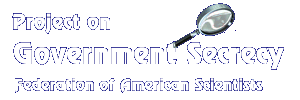 FAS |
Secrecy | 2010 News ||
Search |
Join FAS
FAS |
Secrecy | 2010 News ||
Search |
Join FAS

 |
|
|

Secrecy and Security News
Newer News: January 2011
December 2010
- UN Statement on Wikileaks by the United Nations Special Rapporteur on Freedom of Opinion and Expression and the Inter-American Commission on Human Rights Special Rapporteur for Freedom of Expression, December 21. "The rapporteurs call upon States and other relevant actors to keep these principles in mind when responding to the aforementioned developments."
- Information Sharing Meeting of the Local, Tribal, And Private Sector Policy Advisory Committee, Federal Register Notice, December 21. "The Information Security Oversight Office (ISOO) announces the inaugural meeting of the State, Local, Tribal, and Private Sector Policy Advisory Committee... on January 11, 2011."
- WikiLeaks Poses Legal Challenges for US Prosecutors by Kate Woodsome, Voice of America, December 20. "The U.S. Justice Department is reportedly considering whether to file espionage charges against the WikiLeaks Web site and its founder Julian Assange. The case has raised broad legal questions about how the government will protect the freedom of information and an open Internet, while also protecting privacy and national security."
- Make Julian Assange irrelevant by Dana Milbank, Washington Post, December 18. "Government-secrecy watchdog Steven Aftergood at the Federation of American Scientists reports that the administration has yet to produce recommendations for the "fundamental transformation" of the security classification system that Obama ordered a year ago."
- Could WikiLeaks provoke U.S. crackdown on leaks? by Mark Hosenball and Jeremy Pelofsky, Reuters, December 17. "WikiLeaks's founder Julian Assange's crusade for greater official transparency could backfire by provoking a U.S. government crackdown on leaks that might entangle even journalists, legal experts warn."
- WikiLeaks Contender �Promising,� Analysts Say by Kim Zetter, Wired Threat Level, December 15. "A new transparency site being launched by WikiLeaks defectors is a promising alternative, according to media and government transparency analysts, but its true value will depend on whether it can garner the trust and interest of sources with valuable documents to leak."
- Air Force Blocks Sites That Posted Secret Cables by Eric Schmitt, New York Times, December 15. "The Air Force is barring its personnel from using work computers to view the Web sites of The New York Times and more than 25 other news organizations and blogs that have posted secret cables obtained by WikiLeaks, Air Force officials said Tuesday."
- Julian Assange, Runner Up for Time Person of the Year by Barton Gellman, Time, December 15. "In 2010, WikiLeaks became a revolutionary force, wresting secrets into the public domain on a scale without precedent."
- Is Wikileaks a Force For Good? Four Experts on Our Wiki-Future, Reason.TV, December 13. "Is Wikileaks a force for good, allowing journalists and ordinary citizens a glimpse at what diplomats and politicians are doing in our name? Or could the latest Wikileaks information dump be a net negative for open government advocates, resulting in tighter classification of future documents?"
- Keeping Secrets WikiSafe by Scott Shane, New York Times, December 12. "Can the government still keep a secret? In an age of WikiLeaks, flash drives and instant Web postings, leaks have begun to seem unstoppable."
- Government Agencies Block WikiLeaks, NPR On the Media, December 10. "The Library of Congress announced this week that it blocked its employees from accessing WikiLeaks. Steven Aftergood, director of the Federation of American Scientists' Project on Government Secrecy, says that blocking government analysts from accessing information that every other American can see is a bad and possibly dangerous idea."
- U.S. still warning employees: Don't read or discuss the WikiLeaks documents by Michael Isikoff, NBC News, December 10. "In the past few weeks, more than 1,200 internal State Department cables have been made public by WikiLeaks and received worldwide attention, including regular front-page coverage in The New York Times and countless other news organizations, including MSNBC. But the Obama administration�s attempt to stop people from reading them continues unabated, creating mounting confusion and head-shaking among bewildered federal employees."
- WikiLeaks: U.S. having trouble tying Assange to Manning by Nancy A. Youssef, McClatchy Newspapers, December 10. "Even as some government officials contend that the release of thousands of classified documents by WikiLeaks founder Julian Assange jeopardizes U.S. national security, legal experts, Pentagon officials and Justice Department lawyers concede any effort to prosecute him faces numerous hurdles."
- Federal Employees Will Be Handicapped by Access Barriers to Wikileaks, a personal view of a DHS employee, December 10. "I think more damage will be done by keeping the federal workforce largely in the dark about what other interested parties worldwide are going to be reading and analyzing."
- Can the U.S. Actually Prosecute WikiLeaks? by Joshua Norman, CBS News, December 8. "As a cyberwar erupts over WikiLeaks and its founder, Julian Assange, the question remains as to what the United States can actually do to prosecute the diplomatic cable leakers for endangering national security."
- US declares Wikileaks off-limits to government researchers by Eugenie Samuel Reich, Nature: The Great Beyond, December 7. "The US government is clamping down on scientists' ability to discuss and surf freely as part of its response to the release of classified cables by Wikileaks."
- WikiLeaks Releases Secret List of Critical Infrastructure Sites by Kim Zetter, Wired Threat Level, December 6. "WikiLeaks published a secret memo listing critical infrastructure facilities around the world on Sunday, prompting criticism that the document could serve as a target list for terrorists."
- WikiLeaks fallout leads to an info-sharing clampdown by Sean Reilly, Federal Times, December 5. "The fallout is still settling from WikiLeaks' ongoing disclosure of thousands of diplomatic cables, but for government workers and contractors who handle classified information, a crackdown has already begun."
- WikiLeaks fallout: Why more secrecy might be worse by Nancy A. Youssef, McClatchy Newspapers, December 3. "WikiLeaks' release of tens of thousands of classified government documents on three separate occasions this year has prompted U.S. officials to add layers of new safeguards. But that very impulse has sparked debate among experts about whether those new protections might make national security secrets more vulnerable, not less."
- Is WikiLeaks� Julian Assange a Hero? Glenn Greenwald Debates Steven Aftergood of Secrecy News, Democracy Now, December 3. "WikiLeaks is coming under attack from all sides. The U.S. government and embassies around the world are criticizing the whistleblowing group for releasing a massive trove of secret State Department cables. The WikiLeaks website is struggling to stay online just days after Amazon pulled the site from its servers following political pressure."
- WikiLeaks Exploits Weaknesses in Technology, Human Nature by Kate Woodsome, Voice of America, December 3. "The secrecy system now in place has its roots in the Cold War, when U.S. President Harry Truman signed an executive order in 1951 establishing standards to classify and control information in the name of national security."
- WikiLeaks debate with Steven Aftergood by Glenn Greenwald, Salon, December 3. "This debate, in my view, highlights the core disputes surrounding WikiLeaks quite vividly and is thus worth watching."
- Will WikiLeaks escape Justice? by Josh Gerstein, Politico, December 2. "By Wednesday, the self-proclaimed whistleblower website and its eccentric founder, Julian Assange, were the subjects of bellicose threats from politicians and world leaders, but to this day have faced fewer immediate legal consequences than those selling fake Coach handbags and unauthorized Disney DVDs."
- U.S. Government Mitigation Efforts in Light of the Recent Unlawful Disclosure of Classified Information, White House Fact Sheet, December 1. "As part of an integrated federal government approach to respond to the unlawful and irresponsible disclosure of classified information by Wikileaks, the National Security Staff has been coordinating an interagency effort to examine the policies and practices surrounding the handling of classified information, and to put in place safeguards to prevent such a compromise from happening again."
- Cryptome, Secrecy News : des alternatives � WikiLeaks, LeMonde, December 1.
- WikiLeaks Secrecy Breach May Prompt U.S. to Reverse Post-9/11 Data Sharing by Viola Gienger, Bloomberg, December 1. "The U.S. government is rolling back years of efforts to internally share information on terrorists and other threats, a result that runs counter to WikiLeaks.org founder Julian Assange�s stated goal of making government more open."
- How Many People Hold Clearances?, a discussion from a congressional hearing, December 1. "We can find definitively if any individual has a clearance at any one point in time. To take at that point in time and define the number of all the people that do takes a manipulation of data in databases that weren't intended to do that."
Older News: November 2010
 FAS |
Secrecy |
2010 News ||
Search |
Join FAS
FAS |
Secrecy |
2010 News ||
Search |
Join FAS
 http://www.fas.org/sgp/news/2010/12/index.html
http://www.fas.org/sgp/news/2010/12/index.html
 Maintained by Steven Aftergood
Maintained by Steven Aftergood
 Updated January 3, 2011
Updated January 3, 2011


